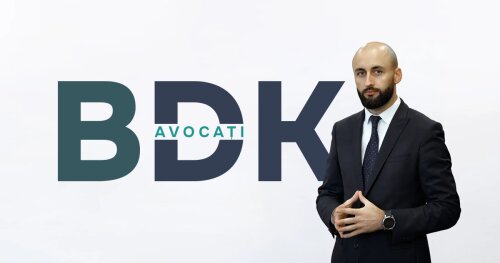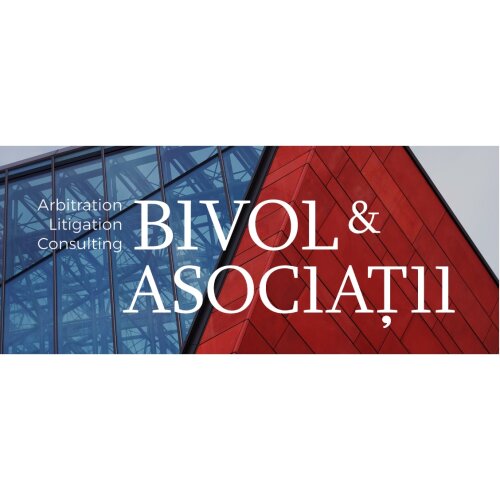Best Tax Increment Financing Lawyers in Republic of Moldova
Share your needs with us, get contacted by law firms.
Free. Takes 2 min.
Or refine your search by selecting a city:
List of the best lawyers in Republic of Moldova
About Tax Increment Financing Law in Republic of Moldova
Tax Increment Financing (TIF) is a public financing method that is used as a subsidy for redevelopment, infrastructure, and other community-improvement projects in the Republic of Moldova. TIF aims to stimulate private investment in areas that are underdeveloped or economically distressed. The concept involves capturing the future tax benefits of real estate improvement to pay for the current costs associated with those improvements. This is achieved by attributing the increase in property tax revenues from new development to pay for the development itself or related public infrastructure.
Why You May Need a Lawyer
Navigating the complexities of Tax Increment Financing in the Republic of Moldova can be challenging. Here are some common situations where legal expertise might be necessary:
- Understanding TIF Contracts: Lawyers can help review and negotiate contracts related to the TIF project to ensure favorable terms.
- Compliance and Regulations: Ensuring that TIF projects comply with local laws and regulations can require specialized legal knowledge.
- Dispute Resolution: Legal assistance might be needed to resolve disputes that arise between developers, investors, or government bodies.
- Application Process: Attorneys can provide guidance through the application process for TIF, ensuring all necessary documentation and procedures are followed.
- Tax Implications: Understanding the specific tax implications for your organization or project requires expert legal advice.
Local Laws Overview
The framework for Tax Increment Financing in Moldova is governed by national and local laws that set forth the guidelines for establishing TIF districts, eligible projects, and the distribution of increment revenues. Key aspects include:
- Eligibility Criteria: Stipulates the conditions under which a project can qualify for TIF.
- Project Approval Process: Details the steps necessary for getting TIF project approval from local authorities.
- Revenue Use: Defines how increment revenues are to be used and managed.
- Reporting Requirements: Obligations for project reporting to ensure transparency and accountability.
- Limitations and Exemptions: Specific limitations and potential exemptions under Moldovan law that apply to TIF projects.
Frequently Asked Questions
What is Tax Increment Financing?
Tax Increment Financing is a financial tool used to subsidize community improvement projects by capturing the future tax benefits generated by the increase in property value within a designated area.
Who can apply for TIF in Moldova?
Typically, local governmental units can apply for TIF designation, and it can involve private developers or investors as partners in the projects.
What types of projects are eligible for TIF?
Eligible projects often include infrastructure improvements, affordable housing, commercial redevelopment, and other enhancements that promote economic growth.
How does TIF affect local taxes?
TIF does not increase property tax rates. It redirects the additional tax revenue generated by increased property values to fund the project.
Are there any risks associated with TIF?
Risks can include project underperformance and the possibility of increased financial obligations for the local government if the tax increment does not meet projections.
What role do local communities play in TIF projects?
Local communities often play an advisory role during the planning stages and may be involved in public consultations regarding the project.
Can TIF be used for residential projects?
Yes, TIF can support residential development, particularly in the case of affordable housing projects.
Is legal advice necessary for TIF projects?
While not required by law, legal advice is highly recommended to navigate the complexity of applicable regulations and contracts.
What documents are needed to apply for TIF?
Applications typically require detailed project plans, financial projections, and compliance with applicable local regulations.
How long does the TIF process take?
The duration can vary depending on project complexity, community involvement, and the approval process, often taking several months to over a year.
Additional Resources
Some additional resources that can be helpful for someone seeking legal advice or information on Tax Increment Financing in Moldova include:
- Ministry of Finance: Provides information on financial laws and regulations.
- Local Government Offices: Your local municipal office can offer guidelines specific to your region.
- Development Agencies: Organizations that can offer insight into development incentives and support.
- Professional Legal Associations: Organizations where you can find directories of lawyers specialized in financing and development law.
Next Steps
If you are considering a TIF project and need legal assistance, here are the steps you should consider:
- Consult a Lawyer: Seek out a lawyer with experience in finance law and TIF projects to discuss your needs.
- Gather Documentation: Prepare any necessary documents, including project plans and financial data.
- Understand Local Guidelines: Familiarize yourself with the specific requirements of your locality regarding TIF.
- Plan for Consultation: Consider initial consultations to get a sense of the services offered and the approach of different legal professionals.
By following these steps, you can ensure you are well-prepared and informed when seeking legal advice on Tax Increment Financing in the Republic of Moldova.
Lawzana helps you find the best lawyers and law firms in Republic of Moldova through a curated and pre-screened list of qualified legal professionals. Our platform offers rankings and detailed profiles of attorneys and law firms, allowing you to compare based on practice areas, including Tax Increment Financing, experience, and client feedback.
Each profile includes a description of the firm's areas of practice, client reviews, team members and partners, year of establishment, spoken languages, office locations, contact information, social media presence, and any published articles or resources. Most firms on our platform speak English and are experienced in both local and international legal matters.
Get a quote from top-rated law firms in Republic of Moldova — quickly, securely, and without unnecessary hassle.
Disclaimer:
The information provided on this page is for general informational purposes only and does not constitute legal advice. While we strive to ensure the accuracy and relevance of the content, legal information may change over time, and interpretations of the law can vary. You should always consult with a qualified legal professional for advice specific to your situation.
We disclaim all liability for actions taken or not taken based on the content of this page. If you believe any information is incorrect or outdated, please contact us, and we will review and update it where appropriate.
Browse tax increment financing law firms by city in Republic of Moldova
Refine your search by selecting a city.
















